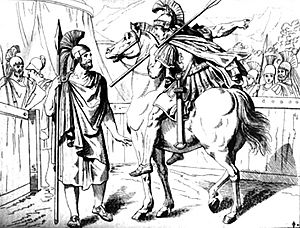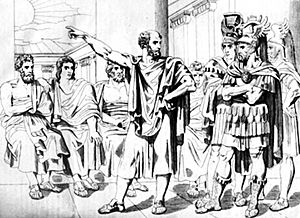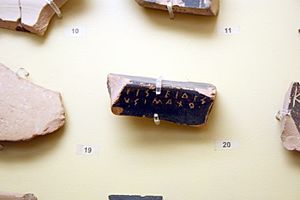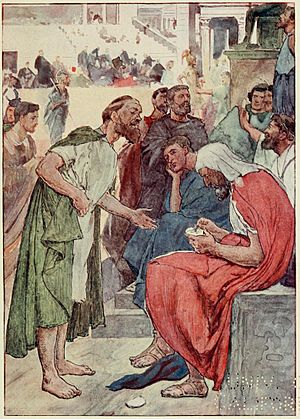Aristides facts for kids
Aristides (born around 530 BC, died 468 BC) was an important leader and politician in ancient Athens. People called him "the Just" because he was known for being fair. He was a key general during the Persian Wars, a big conflict between the Greeks and the Persian Empire.
The ancient writer Herodotus said Aristides was "the best and most honourable man in Athens." Even the famous philosopher Plato spoke highly of him in his writings.
Contents
Aristides' Life and Times
Aristides came from a family that wasn't super rich but was doing okay. His father's name was Lysimachus. When he was young, Aristides became a follower of another statesman named Cleisthenes, who helped create democracy in Athens.
Early Career and the Battle of Marathon
Aristides first became well-known as a strategos (a military general) for his tribe, Antiochis. This was during the famous Battle of Marathon in 490 BC. In this battle, the Athenians bravely fought off a Persian invasion. Because of his excellent leadership there, he was chosen as archon eponymos (a top official) for the next year.
Aristides believed Athens should focus on its land army. This put him against Themistocles, another powerful Athenian leader, who thought Athens needed a strong navy.
Rivalry with Themistocles and Ostracism
According to the writer Plutarch, Aristides and Themistocles were rivals from a young age. Their disagreements eventually led to Aristides being ostracized. This meant he was voted to be sent away from Athens for a period, usually ten years. This happened sometime between 485 and 482 BC.
There's a famous story about his ostracism: An uneducated voter who didn't recognize Aristides asked him to write Aristides' name on his voting shard (called an Ostracon). Aristides asked if he had done anything wrong to the voter. The voter replied, "No, I don't even know him, but it bothers me that everyone calls him 'the Just'!" So, Aristides calmly wrote his own name on the shard.
Return and Victories Against Persia

In early 480 BC, Aristides was called back to Athens. This was because all exiles were allowed to return to help defend the city against new Persian invaders. He was again chosen as a general for the year 480–479 BC.
At the Battle of Salamis in September 480 BC, Aristides strongly supported Themistocles. After the Greeks won this big naval battle, Aristides led Athenian soldiers onto the island of Psyttaleia. They wiped out the Persian soldiers stationed there, securing the victory.
In 479 BC, Aristides was re-elected as general. He was given special command of the Athenian forces at the Battle of Plataea in August 479 BC. This was another major battle where the Greeks defeated the Persians on land. He even helped stop a secret plot among some soldiers in the army.
Forming the Delian League
Aristides earned the trust of the Greek allies from Ionia. After they broke away from the Spartan admiral Pausanias, they chose Aristides to lead their new group. This group, formed in 478 BC, was called the Delian League. They gave him full power to decide how much money or ships each member should contribute. His plan was seen as very fair by everyone. It became the basis for how the League was funded for most of its existence.
Aristides remained a very important figure in Athens. He seemed to stay on good terms with Themistocles, even helping him trick the Spartans when Athens was rebuilding its city walls.
Later Life and Legacy
Some historians say Aristides died in Athens, while others believe he died during a trip to the Black Sea. He lived long enough to see Themistocles also get ostracized. Aristides was always generous towards Themistocles, even with their rivalry. He died before Pericles, another famous Athenian leader, rose to power.
It seems Aristides' family lost a lot of money during the Persian invasions. He didn't even have enough money for his own burial. Because of his great service to Athens, his family members continued to receive money from the state, even many years later.
Ancient Writers on Aristides

Many ancient writers talked about Aristides' life. Besides Herodotus, he is also the main subject of one of Plutarch's Parallel Lives. Plutarch wrote this book much later, during the time of the Roman Empire.
Aristides is also praised by Socrates in Plato's famous discussions called Gorgias and Meno. Socrates used Aristides as a great example of a good leader.
Memorials and Representations
There is a statue of Aristides in Louisburg Square in the city of Boston, USA. A painting of Aristides from 1806 by Charles Brocas can be seen at the Musée des Augustins in Toulouse, France.
See also
 In Spanish: Arístides para niños
In Spanish: Arístides para niños
 | May Edward Chinn |
 | Rebecca Cole |
 | Alexa Canady |
 | Dorothy Lavinia Brown |



